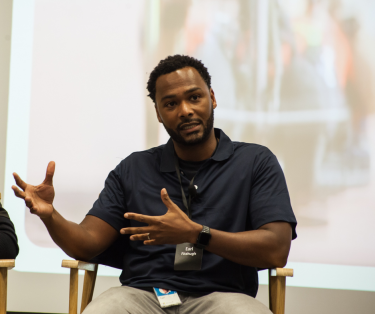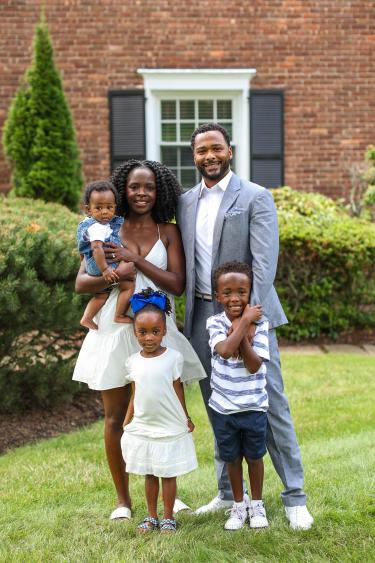Alumni
Building a Career in Tech with a Strategic but Open Mindset
—
Earl Fitzhugh (MBA '12), Chief Operating Officer for the Global Small and Medium Business (SMB) Segment of Microsoft’s Commercial Sales Organization; Vice Chair of Digital Connections Committee on Stern’s Alumni Council

Earl Fitzhugh (MBA '12) offers up life lessons on achieving outsized outcomes, what motivated his move from McKinsey to Microsoft, his advice on managing a career, plus one of his unexpected favorite Stern experiences and why he’s so involved as an alum.
You moved from McKinsey to Microsoft a few years ago to head up digital acquisitions and focus on growth. What drew you to make that transition?
While at McKinsey, I focused on the intersection of growth and technology–pricing, sales, go-to-market strategy, marketing, product innovation, all the good stuff. But after 10 years, I was at a crossroads–should I go for Senior Partner or shift toward my aspiration of being an operator and business builder. During the pandemic, as remote/digital sales took off–an area where I had developed distinctive expertise–I was offered an exciting opportunity to move to Microsoft and transform a team of ~2,000 frontline retail workers into world-class digital sellers. It was an opportunity to lead a global team and own a P&L at a top tech company. It just made a ton of sense for me as a next step.
What do you enjoy about your role at Microsoft?
Well in this exciting and dynamic era I’ve already changed roles at Microsoft a couple of times. My favorite aspect of my first role as the Sales leader for the Direct Sales and Success (DSS) team was the opportunity to take a team of highly-diverse, former frontline retail workers–many of whom were STARS (skilled through alternative routes) without a college degree–and transform them into an enterprise digital sales organization.
On our way to tripling our revenues in two years through building digital sales excellence, we graduated 10 to 20 percent of our workforce each year into broader roles within Microsoft such as Customer Success and Field Sales. One of our primary success measures was scaling up and launching talent. It was an incredible opportunity to help grow these non-traditional talents onto a career path with a different trajectory. I love running into DSS alumni at Microsoft and other tech companies these days.

What is it like working in tech at a time when AI is disrupting the industry?
I feel like I am surfing a big wave. It’s fascinating to be part of shaping a technology wave from a sales perspective. We’ve had the opportunity to be Customer Zero for Microsoft’s Copilot for Sales. It’s been pretty incredible!
For our sales associates, AI has helped with productivity by quickly summarizing customer account data, providing insight about company context, and putting the best resources at their fingertips. What took our sellers up to 30 minutes of prep per customer conversation now takes minutes. But we are just at the beginning of what is possible.
What advice do you have for students or alumni who are looking to build a career in tech?
Pursue an area you find genuinely interesting and have an open mindset about the roles you want. When you get an interview, focus on making a good impression and getting on the company’s radar since roles change within a company all the time. Be flexible and play the long game. Also, think about where in tech you want to be: Big Tech, startups, or creating your own company as an entrepreneur. There are many places to play.
What is your approach to managing teams and making people feel comfortable with constant change?
First, I try to help my team be centered around core values, clarity on their personal aspirations, and the priorities in their life they want to balance. You can have it all, but not necessarily all at the same time. I also try to remind folks that as they say, ‘the only constant in life is change’. Tech is a fast-paced space. I encourage people to develop a vision and narrative around their personal journey and like a great friend and mentor told me, reframe the career journey as more of a jungle gym than a ladder. Change is often good. We all need to be challenged periodically to continue to stretch ourselves.
Tell us about your favorite Stern classes, professors, and experiences?
There were so many! I was involved in a lot of clubs–entrepreneurship, consulting, AHBBS, and was an officer in all of them. I loved Professors Damodaran, Marciano, Silber, and Ljungqvist’s classes. Marketing was a class that surprised me. I ended up loving it, but hadn’t expected that because I came in with an engineering background. But I’ve been in Sales and Marketing for a decade now. Over my career, I’ve used a lot of the marketing concepts I learned in that class.
What Stern experiences have served you well in your career?
So many great experience from being a member of multiple clubs and doing the DBI China class. But casing definitely stands out. I owe so many MBA2s and classmates for the time they invested with me. One particular example stands out- I wasn’t initially strong at casing, so I asked an alum named Tushar Kanungo who was already in consulting for advice. He recommended forming a casing group with students. We worked really hard and became pretty strong at casing. We did case prompts weekly, videotaped ourselves, and did public math. We ended up having some great outcomes with folks getting offers across top companies. It was a great experience in seeing how working hard with a small group of friends and having some fun along the way can drive outsized outcomes.
What was the best career advice you received?
Talk to people who are doing what you want to do. Tap alumni for insights, ask how things played out for them, or what they wished they had done differently. Figure out where you want to be, then work back from there. I shared my career goals with an emeritus senior partner from McKinsey, and he helped me walk through the steps I needed to get to where I wanted to be–which led me to Microsoft.
You chair Stern Alumni Council’s Digital Connections Committee and are also a Corporate Ambassador for Microsoft. Why do you stay involved with the School?
I got so much out of my time and experience at Stern. I’m passionate about giving back and paying it forward. I was raised with the mindset of leaving something better for your having been there or involved with it. As an alum, I could see the value that the Corporate Ambassadors Program offers both alums and students in a way that wasn’t as big when I was at Stern. It’s rewarding to connect back with the School to support students.
How do you see Stern playing a role in supporting alumni in managing their careers over the next decade?
Offering a chance to retool and keep on learning. For example, the graduate level auditing program is excellent and a big value to Sternies. I can also see a future where the School could offer retooling sprints via virtual courses for one hour a time over a few weeks. But overall, giving alums a place to learn new skills and get expertise in an area is useful.
You have three children? How do you balance work and life?
I think that balance shifts depending on where you are in life. For me, the biggest shifts have been as we’ve welcomed each of our children. After our first child, I started working with more local clients to limit my consulting travel to one night away a week. Having more time and flexibility for family became even more important with the arrival of our second child. Moving to Microsoft has afforded me a fantastic work life balance. One of the things I also learned from my colleagues at McKinsey is the importance of building the scaffolding and support structure around you by bringing in help with childcare and other things. I also know my priorities, but truthfully we are in the thick of it right now.

Earl with his wife, Patricia, his sons, McCoy and Davis, and his daughter Ellison
What do you do in your downtime to relax? Any hobbies?
I like to walk. I try to walk every day. I try to do my one on one calls with my team as ‘walk and talks’. Most days I also get to the gym early in the morning, which is relaxing in a different way. I also enjoy taking trips with my wife to recharge- she likes to sit by the pools in exotic places and just relax.
Last place you went for vacation? And where to next?
As a family we went to Jamaica, and then my wife and I headed to Ashville for a friend’s wedding. Our next big trip is Sicily.
Favorite recent show, book, or podcast?
I’ve been rereading Seth Godin's book, Purple Cow and also The Almanack of Naval Ravikant. For a TV show, I liked Foundation. As a sci-fi enthusiast I think they’ve done a good job balancing fidelity to the source material while keeping us guessing. And I am listening to a podcast called Founders, which is really well done.
